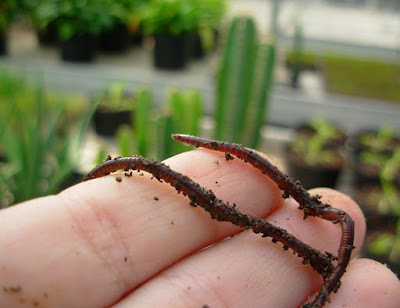TerraCycle cumple siete años de operaciones en México y aquí estamos encantados de darlo a conocer aún más.
El equipo de
Terracycle se ha puesto en contacto con nosotros y ellos mismos nos cuentan su historia.
Cada año se generan
5,000 millones de toneladas de desechos en el mundo, de los cuales sólo
el 20% es reciclable. El 80% restante termina en tiraderos como sucede la mayoría de las veces en México o son quemados y usados como combustibles en el caso de algunos países europeos.
Dos dificultades mayores tiene el reciclaje tal y como está concebido ahora: se genera excesiva basura y la que se crea está compuesta por materiales demasiado complejos. Algunos envoltorios de alimentos contienen hasta 20 tipos de plástico diferentes. Así que por muy buena voluntad que tengamos los ciudadanos, la mayoría de lo que se tira no puede utilizarse de nuevo, a pesar de que creamos lo contrario.
La iniciativa de un joven canadiense ha dado un giro a esta dinámica en los últimos años.
Tom Szaky, alumno en la Universidad de Princeton, comenzó
TerraCycle, Inc produciendo fertilizantes orgánicos mediante el embotellado de
“excrementos licuados de lombrices” en botellas de refrescos usadas. Desde este comienzo poco prometedor, TerraCycle ha llegado a ser una de las empresas verdes de mayor crecimiento en el mundo.
Hoy,
TerraCycle es una
reconocida compañía internacional de supra reciclaje y reciclaje que recolecta envolturas y productos difíciles de reciclar y los transforma en productos innovadores y económicos. TerraCycle está ampliamente reconocida como líder mundial en la recolección y reutilización de residuos post-consumidor no reciclable.
En el mes de Septiembre TerraCycle México está cumpliendo su 7° aniversario recolectando y reciclando basura alrededor de la república mexicana; dicho lo anterior, dejamos un recordatorio de cómo podemos volvernos recolectores dentro del país y no solo contribuir a la mejor de nuestro ambiente, también retribuir a otras asociaciones sin fines de lucro.
¿Cómo funciona?
La operación está organizada en programas, cada una de las cuales se centra en un producto en particular difícil de reciclar como envolturas de jabón, bolsas de pan, empaques de galletas, bolsas de botana, productos de cuidado bucal y envolturas de pan dulce. Estos desechos pueden recolectarse en cajas de cualquier tamaño para su recolección.
TerraCycle paga todos los gastos de envío, una vez enviados los desechos a la empresa, el recolector suma dinero a una cuenta individual ($0.25 por empaque), que es donado a organizaciones filantrópicas, escuelas y programas comunitarios.
La basura recolectada (envolturas, sobres, tubos, etc.) es convertida en carteras, monederos, estuches mochilas o bolsas, que son fabricados por terceros y comercializados por la compañía.
¿Cómo convertirse en un Recolector?
Varios equipos de recolección de residuos se han puesto a trabajar en los diferentes programas que TerraCycle (26,862 personas alrededor de México). La dinámica para comenzar es muy sencilla; se debe ingresar a la página
Terracycle México y escoger los programas de recolección que van desde bolsas de botana hasta productos de cuidado bucal, una vez realizado este paso se comienza con la recolección, los recolectores podrán ver por medio de la página los puntos que van ganando y de esta forma convertirlos en dinero para la organización de su elección.
Una gran ventaja de estos programas es que los recolectores pueden dar de alta cualquier asociación sin fines de lucro, escuela o hasta iglesia de su comunidad para ver de una forma directa los beneficios de su donación.
La Cantidad más reciente que se ha logrado donar son
409,936.74 pesos.
Algunas de las asociaciones que se han visto beneficiadas son las siguientes:
- APANICAL (Asociación de Padres de Niños con Cáncer y Leucemia) - Ubicada en Ciudad Juárez, Chihuahua, ha recibido 135,360 pesos.
- Escuela Secundaria 20 Juan F. Escamilla - Recibió 22,999 pesos, esta escuela se localiza en Monterrey, Nuevo León.
- Escuela Francisco I. Madero - En Mezquitic, Jalisco recibió 20,029 pesos.
- Operación Sonrisa -En Zapopan, Jalisco recibió 16,185 pesos.
¿Y tú, te atreves a hacer algo por el medio ambiente?
TerraCycle empezó como una compañía de fertilizantes orgánicos y ha llegado a ser una de las más fuertes en productos ecológicos en el mundo.
Tom tuvo el sueño de encontrar una nueva forma de ser responsables con el medio ambiente, beneficiar al planeta, a la gente y a su propio negocio.
Las nuevas generaciones tienen mayor conciencia y preocupación por el uso y el futuro de los recursos naturales, sin embargo aún queda mucho camino por recorrer, y se vuelve necesario que la población mexicana ponga de su parte para hacer del planeta un lugar más sustentable. Si nosotros no comenzamos un cambio hoy,
¿quién lo hará?.
Espero que te haya sido interesante y que seas un poco más consciente de que reciclar y reutilizar es muy importante.
Habiendo gente así se puede estar tranquilo de que a largo plazo el planeta lo agradecerá.


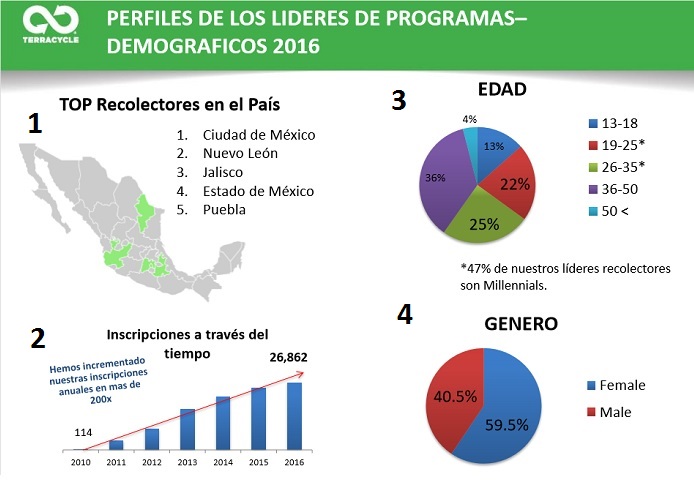
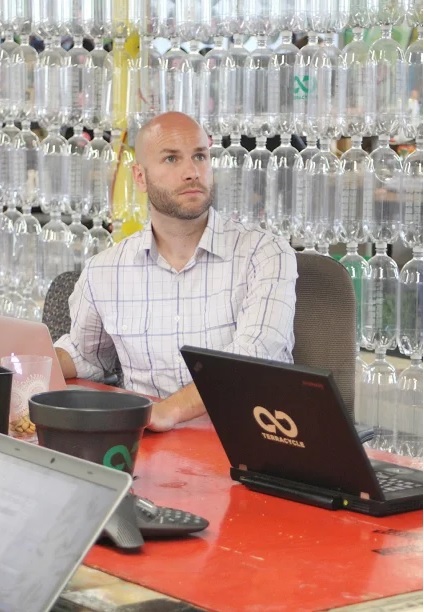

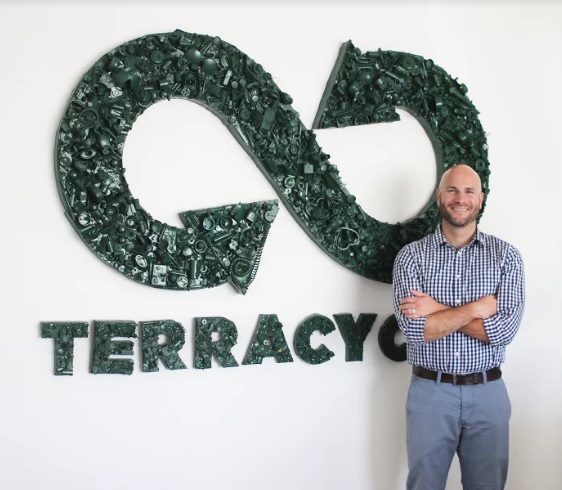
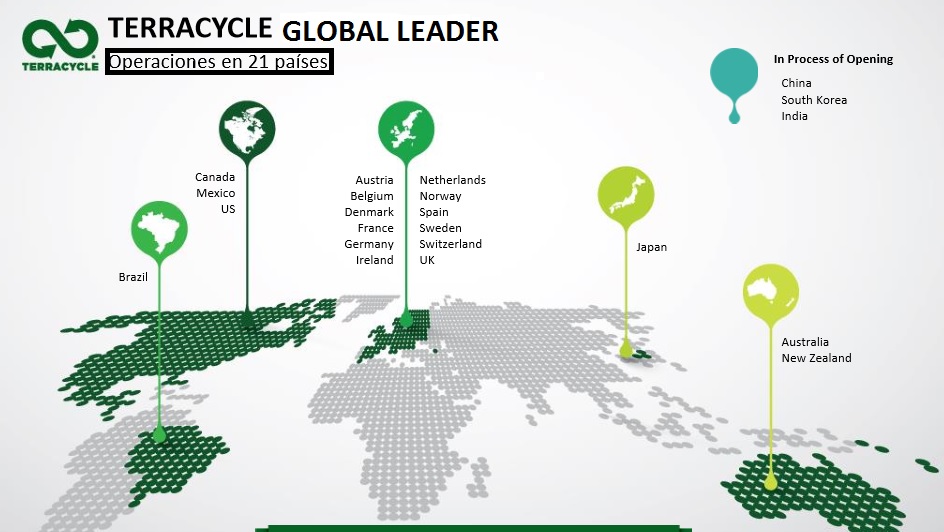
 TerraCycle es reconocido internacionalmente como una compañía que desarrolla sistemas de recolección selectiva para el reciclaje de más de 100 tipos de basura que son muy difíciles de reciclar (objetos desechables, empaques flexibles, objetos de oficina, productos de belleza, cuidado bucal, cápsulas de café usadas y colillas de cigarro) que no suelen ser reciclados por programas de reciclaje tradicionales. Actualmente en 20 países, esta empresa se asocia con grandes compañías, marcas y gobiernos para implementar programas de reciclaje diseñados específicamente para los productos y sus empaques. Cerca de 60 millones de recolectores están ya trabajando con TerraCycle a través de:
TerraCycle es reconocido internacionalmente como una compañía que desarrolla sistemas de recolección selectiva para el reciclaje de más de 100 tipos de basura que son muy difíciles de reciclar (objetos desechables, empaques flexibles, objetos de oficina, productos de belleza, cuidado bucal, cápsulas de café usadas y colillas de cigarro) que no suelen ser reciclados por programas de reciclaje tradicionales. Actualmente en 20 países, esta empresa se asocia con grandes compañías, marcas y gobiernos para implementar programas de reciclaje diseñados específicamente para los productos y sus empaques. Cerca de 60 millones de recolectores están ya trabajando con TerraCycle a través de:
 “Estamos encantados de comenzar esta innovadora alianza con TerraCycle. El objetivo es reciclar cada vez más basura, incluyendo la más compleja de reciclar, confiando en el compromiso de todos – incluyendo ciudadanos, gobiernos y empresas – deseosos de transformar su basura en nuevos recursos para formar una economía cada vez más circular y virtuosa en Europa” son las palabras de Jean-Marc Boursier, presidente adjunto del departamento de Reciclaje y recolección en Europa.
“Estamos encantados de comenzar esta innovadora alianza con TerraCycle. El objetivo es reciclar cada vez más basura, incluyendo la más compleja de reciclar, confiando en el compromiso de todos – incluyendo ciudadanos, gobiernos y empresas – deseosos de transformar su basura en nuevos recursos para formar una economía cada vez más circular y virtuosa en Europa” son las palabras de Jean-Marc Boursier, presidente adjunto del departamento de Reciclaje y recolección en Europa.



